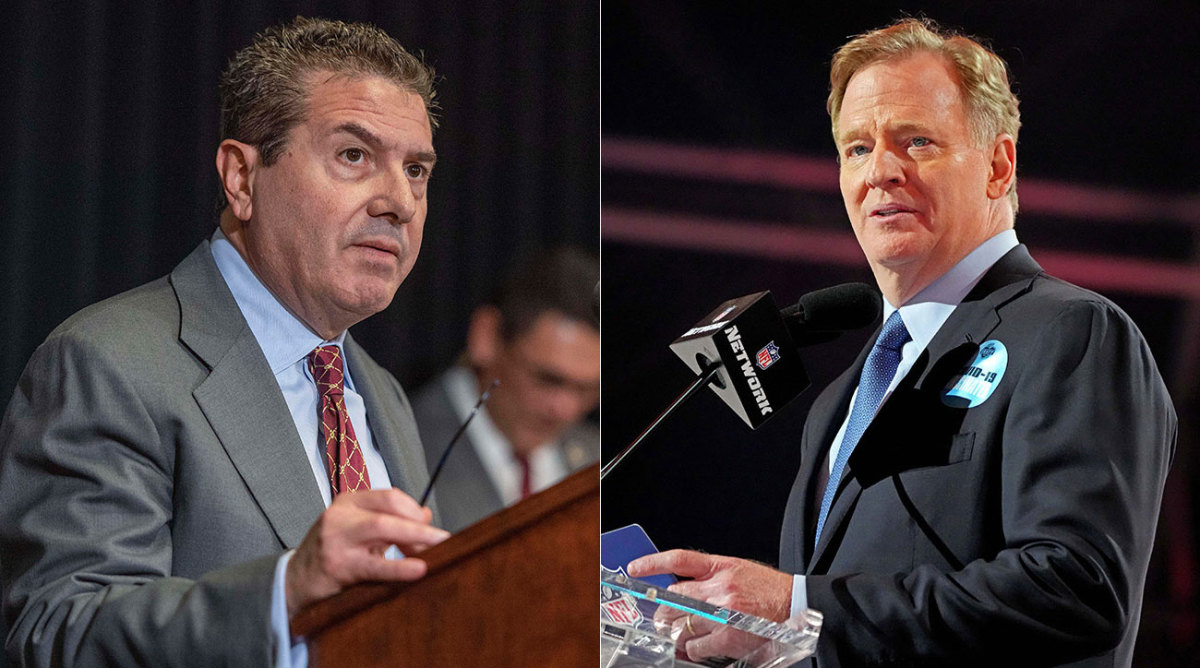The NFL Can Still Turn Daniel Snyder’s Ongoing Mess Into a Positive
Twenty pages’ worth of alleged financial improprieties—committed by the Commanders, implicating owner Daniel Snyder and compiled by the U.S. House Oversight and Reform Committee—were released to the press Tuesday en route to their intended destination, the Federal Trade Commission. There, Snyder may find himself under investigation.
As first reported by The Washington Post, a longtime Commanders employee claims that under direction from his superiors, he would lap funds from NFL-related revenue into some other bucket, like a Kenny Chesney concert or a Notre Dame football game at Washington’s stadium, so the organization wouldn’t have to share said revenue with the league. The employee is also claiming the team withheld $5 million in refundable season-ticket deposits from fans.
A Commanders spokesman replied to Sports Illustrated’s request for comment Tuesday to say that the organization has nothing new to add outside of the team’s denial of said crimes at the end of March. At the time, the Commanders “categorically denied any suggestion of financial impropriety of any kind at any time.”

It is hard to separate any new allegations of wrongdoing by Snyder from the knowledge that this is the same owner who was fined $10 million after an investigation into a workplace rife with sexual harrassment and mysoginy—the red flag, we argued recently, that would have marked a much more fitting reason for an end his tenure as an NFL franchisee. Now, at least, it seems a case is being built in the court of public opinion to ease the burdens associated with overthrowing an entrenched NFL owner whom many inside of the league and out wanted gone a long time ago. The league’s tight-knit circle of power brokers is wary of setting a precedent where skeletons in one’s closet (especially those involving harassment or creative accounting) cost them a chance to keep their name on the owners’ suite, but the firehose of allegations related to Snyder, if true, will leave them with no choice but to trigger an executive committee vote of removal. It will also set a high standard—horrifying neglect and crimes of high finance—for losing a team so that none of the 30 other owners who run teams will also be called upon to pack up and leave right now.
It’s all a game of twisted politics, a very American circus full of performative efforts to reach an intended result. But we’re here to argue that if Tuesday’s developments are what they may prove to be, they can provide the NFL with a unique opportunity to deliver some semblance of justice and better itself in the process. If Snyder is indeed guilty of what his former employee alleges, and this meets some kind of rich-guy standard at which the league can extract Snyder, it should use the vacancy to diversify its ownership group. It should leave the league a little better than Snyder found it.
Of course, this is not going to make what happened in the past O.K. We encourage everyone to listen to a congressional hearing in which survivors of Snyder’s workplace harassment detailed the dread with which they woke up each morning before heading into the office. In a just society, this alone would prevent a person from getting to call the shots ever again. In the NFL, it takes a hand caught in the money jar before anyone takes that kind of action.
There isn’t enough Listerine in the world to wash the taste out of everyone’s mouth, but Roger Goodell and the league’s ownership circle need to look at the best possible options at their disposal to salvage a very rare franchise opening should the Snyder situation result in an ouster. Currently, there are two owners of color in the NFL (Shad Khan in Jacksonville and Kim Pegula in Buffalo), and the league has no Black owners, despite having 70% Black players. (The Broncos are currently for sale, and the league reportedly courted Robert F. Smith as a possible buyer, but Walmart heir Robert Walton has reportedly emerged as the favorite.)
The void of diversity has led to a wealth of problems, including a recent coaching crisis that spurned a lawsuit from former Dolphins coach Brian Flores. A trove of emails sent by former Raiders coach Jon Gruden to—surprise—a former Commanders employee (Bruce Allen) revealed a number of racist, misogynistic and anti-LGBTQ comments that further stoked the fires of cynicism and division within the NFL.
Because owners answer to no one, no rule—not even the one requiring teams to consider diverse candidates for coaching positions—has any real power. Owners tend to hire people they are familiar with. The result is more of what we’ve seen in the past. At stake is the long-term health of a league that won’t continue to succeed without inclusion.
Here, on the horizon, is a potential penance; an opportunity to look for one second like an entity with concern and feeling. Supporters of the NFL donning their Rob Lowe–style hats will argue that the league is not some forum for idyllic justice. Like the rest of society, it operates under capitalistic tendencies. The size of one’s legal team decides who is guilty. The size of one’s bank account decides who gets to buy The Next Thing.
Of course, Goodell and the owners don’t always have to submit to this way of thinking. They can retroactively punish Snyder for what his employees went through, and they can fill his empty chair with someone driven to ensure fewer people show up to work feeling isolated, scared, targeted or judged.
They can be the entity they should have been back when we laughed at the paltry (to Snyder) $10 million fine and soft suspension he received following the completion of his workplace harassment investigation. They can do better.
More NFL Coverage:
